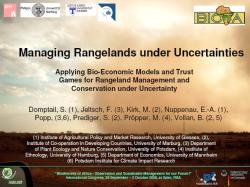|
|
|
 |
|
|
Presentation
< back to presentation overview
| Details of the presentation |
| Presentation |
Oral presentation |
| Title |
Applying Bio-Economic Models and Trust Games for Rangeland Management and Conservation under uncertainty
|
| PDF Download |
 Download PDF (Filesize 2.2 MB)
Download PDF (Filesize 2.2 MB)

|
| Short title |
Managing rangelands under uncertainties
|
| Author(s) |
Domptail, S.(1); Prediger, S.(2); Vollan, B.(2,5); Kirk, M.(2); Nuppenau, E.-A.(1); Popp, A.(3,6); Pröpper, M.(4)
|
| Presenting author |
Domptail, S.; Prediger, S.
|
| Institution(s) |
(1) Institute of Agricultural Policy and Market Research, University of Giessen; (2) Institute of Co-operation in Developing Countries, University of Marburg; (3) Department of Plant Ecology and Nature Conservation, University of Potsdam; (4) Institute of Ethnology, University of Hamburg; (5) Department of Economics, University of Mannheim; (6) Potsdam Institute for Climate Impact Research
|
| Keywords |
ecosystem values, cooperation, trust, bio-economic modelling, uncertainty, rangeland management
|
| Abstract |
The management of rangeland within farming systems is of high importance for biodiversity conservation in Namibia and the northern Cape. There is a need for ensuring the sustainable development of agricultural activities. Yet, rangeland managers in the arid zones of southern Africa face a number of challenges and uncertainties at the environmental, economic, and institutional levels. We present here two of the approaches used in BIOTA south which help to understand the difficulty of managing under uncertainties.
First, bio-economic modelling was used to explore interactions between the ecological and economic dynamics at the farm level, applied for commercial systems. We price degradation and assess the impact of uncertainties concerning rainfall, prices, and ecological degradation processes on the farm strategy and results. Second, field experiments were used to understand which uncertainties communal farmers face while cooperating for pasture management. The analyses of trust and co-operation experiments have proven to be an effective methodological instrument to assess informal institutional requirements, but also the needs for and risks of external interventions.
All results provide information for the formulation of regionally adapted NRM approaches. In addition, both methods can generate heuristics for cooperation and strategies decisions which result in land use patterns needed as a basis for agent-based bio-economic models for communal or resettlement lands.
|
| Congress Topic |
Land use, impact and value
|
| Topic No. |
3.10 |
| Notes |
---
|
| Ref. No. |
602 |
|
|
|
